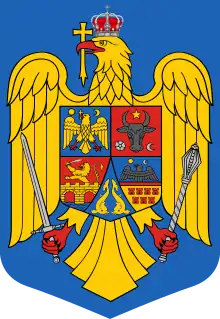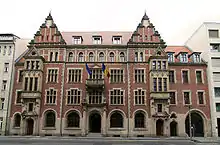 Distribution of Romanian citizens in Germany (2021) | |
| Total population | |
|---|---|
| 1,096,000 with Romanian ancestry (2022)[1]
883,670 Romanian citizens (2022)[2] | |
| Regions with significant populations | |
| Berlin · Munich · Frankfurt · Hamburg · Rhein-Ruhr · Nuremberg · Stuttgart · Bremen · Düsseldorf | |
| Languages | |
| Romanian • German
Dialects
| |
| Religion | |
| Predominantly † Eastern Orthodox Christianity (Romanian Orthodox Church), also Roman Catholic, Greek Catholic, Protestant |
| Part of a series of articles on |
| Romanians |
|---|
 |
Romanians in Germany are one of the sizable communities of the Romanian diaspora in Western Europe. According to German statistics, in 2022, the number of Romanian citizens in Germany was 883,670. [3] The number of people with Romanian ancestry in 2022 (defined as all persons who migrated to the present area of the Federal Republic of Germany after 1949, plus all foreign nationals born in Germany and all persons born in Germany as German nationals with at least one parent who migrated to Germany or was born in Germany as a foreign national) was 1,096,000.[4]
History


Emigration to Germany from Romania was common throughout the 20th century, and continued steadily way into the early 21st century. Large numbers of ethnic Germans of Romania (most notably Transylvanian Saxons and Banat Swabians) left the country prior, during, and after the events that ultimately led to World War II.
In the times of the communist regime in Romania, albeit the borders were officially closed by authorities, significant numbers of Romanian-Germans were allowed to emigrate to West Germany, particularly in the later years of the Ceaușescu era. This formed part of a series of ethnic migrations (including Jews to Israel and Hungarians to Hungary), which were tolerated under the then socialist rulership. During the 1980s, more than half of the people who left Romania went to Germany.[5]
After the Romanian Revolution which took place in December of 1989, there has been a mass migration of Transylvania Saxons to Germany, approximately half a million of them immigrated to Germany.[6]
Emigration of ethnic Romanians to Germany become quite common in the 21st century, particularly after the entry of Romania in the European Union in 2007. The Romanian diaspora in Germany has a strong presence. If descent is actually taken into account as the main criterion of immigration, then the total number of individuals living in Germany who stem from Romania (both Romanian-German and Romanian) may amount to as much as 2,000,000 residents, therefore putting the Romanian diaspora living in this country the largest of all Romanian ones living within the European Union.
Distribution
According to German statistics from 2016, the number of Romanian citizens in Germany on 31 December 2015 was 452,718, which was up from 94,326 in 2008.[7] By 2022, the number had increased to 883,670 Romanian citizens.[8]
| Number of Romanians in larger cities | |||||||||
| # | City | People | |||||||
|---|---|---|---|---|---|---|---|---|---|
| 1. | Berlin | 24,264 | |||||||
| 2. | Munich | 18,845 | |||||||
| 3. | Nuremberg | 14,903 | |||||||
| 4. | Frankfurt | 10,451 | |||||||
| 5. | Hamburg | 10,010 | |||||||
| 6. | Duisburg | 8,853 | |||||||
| 7. | Augsburg | 7,242 | |||||||
| 8. | Karlsruhe | 6,269 | |||||||
| 9. | Stuttgart | 6,121 | |||||||
| 10. | Mannheim | 5,763 | |||||||
| 11. | Offenbach | 5,471 | |||||||
| 12. | Cologne | 4,841 | |||||||
| 13. | Düsseldorf | 4,756 | |||||||
| 14. | Essen | 4,652 | |||||||
| 15. | Dortmund | 4,567 | |||||||
| 16. | Bremen | 4,243 | |||||||
| 17. | Gelsenkirchen | 4,216 | |||||||
| 18. | Leipzig | 4,161 | |||||||
| 19. | Wiesbaden | 3,265 | |||||||
| 20. | Hanover | 3,135 | |||||||
The distribution of Romanian citizens by German states is as follows (as of 2022):[9]
- Bayern 209,865
- Baden-Württemberg 178,240
- Nordrhein-Westfalen 164,220
- Hessen 82,010
- Niedersachsen 74,805
- Rheinland-Pfalz 48,975
- Berlin 27,990
- Schleswig-Holstein 20,210
- Sachsen 15,120
- Thüringen 13,475
- Sachsen-Anhalt 10,740
- Saarland 9,870
- Hamburg 9,790
- Brandenburg 8,730
- Mecklenburg-Vorpommern 5,570
- Bremen 4,060
Notable people
 |  |  | .jpg.webp) |  |  |  |
 |  | .jpg.webp) |  | _2017.jpg.webp) |  | .jpg.webp) |
Art
- Mona Ardeleanu, painter
- Adrian Ghenie, painter
- Petre Hârtopeanu (1913–2001), painter
- Diet Sayler, painter and sculptor
- George Ștefănescu (1914–2007), painter
Entertainment
- Ingrid Bisu, actress
- Mircea Crișan (1924–2013), actor, comedian
- Maria Drăguș, actress
- Marc Dumitru, actor and musician
- Alexandra Maria Lara, actress
- Al Munteanu, film producer
- Florian Munteanu, actor, best known for his role as Viktor Drago in the drama film Creed II
- Călin Netzer, film director
- Oana Nechiti, dancer and current judge for the reality television show Deutschland sucht den Superstar
- Lupu Pick (1886–1931) film director, producer and screenwriter (Romanian mother)
- Anna Schumacher, actress
- Oana Solomon, actress
- Sabin Tambrea, actor
- Johanna Wokalek, actress
Music
- 12 Finger Dan, hip hop producer, member of the production duo Soulbrotha
- Ahzumjot, producer and rapper (Romanian mother)
- Amar, rapper, best known for his association with Kool Savas
- Sergiu Celibidache (1912–1996), conductor and composer
- Roger Cicero (1970–2016), jazz and pop musician
- Michael Cretu, music producer, songwriter and founder of Enigma
- Damae, singer, former vocalist of trance group Fragma (Romanian mother)
- Hubert Daviz, hip hop producer
- Alice Francis, singer and composer (Romanian mother)
- Peter Herbolzheimer (1935–2010), jazz trombonist and composer
- Nicolae Herlea (1927–2014), baritone
- Antonio Lucaciu, jazz saxophonist
- Ramona Nerra, singer and songwriter
- Miss Platnum, singer and songwriter
- Michael Radulescu, composer
- Valentin Radutiu, cellist
- Linda Teodosiu, singer and songwriter
Politics
- Joana Cotar, member of the Alternative for Germany (AfD) party
- Markus Frohnmaier, member of the Alternative for Germany (AfD) party
- Ramona Pop, member of the Alliance '90/The Greens
- Octavian Ursu, member of the Christian Democratic Union
Sports
- Karim Adeyemi, footballer (Romanian mother)
- Michael Andrei, handballer
- Alina Astafei, track and field athlete
- Francis Bugri, footballer (Romanian mother)
- Liviu Călin, basketball coach, who discovered German NBA player Dennis Schröder
- Călin Colesnic, former managing director of the Hispania Racing F1 Team
- Nicolae Firoiu, water polo coach
- Ralph Gunesch, footballer
- Andreas Ivan, footballer
- Petre Ivănescu, handball coach
- Simone Laudehr, football player (Romanian mother)
- Mihai Leu, professional boxer
- Elena Leonte, handball player
- Stelian Moculescu, volleyball coach
- Maximilian Nicu, footballer
- Liviu-Dieter Nisipeanu, chess grandmaster
- Dragoș Oprea, handballer
- Gerhard Poschner, footballer
- Denis Radovan, professional boxer and IBF European Middleweight Champion
- Marcel Răducanu, footballer
- Albert Streit, footballer
- Romy Tarangul, judoka
- Monica Theodorescu, equestrian
- Andreas Toba, artistic gymnast
- Alexandra Wenk, swimmer (Romanian mother)
- Luminita Zaituc, long-distance runner
Other
- Cornel Chiriac (1941–1975), journalist, radio producer and jazz drummer
- Ricarda Ciontoș, curator and production manager
- Ruxandra Constantinescu, biophysicist
- Eugen Coșeriu (1921–2002), linguist
- Miriam Davoudvandi, journalist (Iranian Romanian)
- Georg Maurer (1907–1971), poet
- Paul Miron (1926–2008), linguist. The first professor of Romanian language and literature in West Germany
- Vlad Mugur (1927–2001), theater director
- Dan Petrescu (1953–2021), Romanian businessman and billionaire, one of the richest people in Romania at the time, stayed in West Germany for around a decade and had German citizenship
- Ion N. Petrovici, neurologist
- Adriana Popescu, writer
- Nicolaus Sombart (1923–2008), sociologist
- Catalin Voss, entrepreneur
See also
References
- ↑ "Bevölkerung mit Migrationshintergrund".
- ↑ "Ausländische Bevölkerung nach Altersgruppen und ausgewählten Staatsangehörigkeiten".
- ↑ "Ausländische Bevölkerung nach Altersgruppen und ausgewählten Staatsangehörigkeiten".
- ↑ "Bevölkerung mit Migrationshintergrund".
- ↑ Porumbescu, Alexandra (2015). "Historical Landmarks of the Romanian's Migration to Germany" (PDF). Journal of Humanities, Culture and Social Sciences. 1 (1): 27–40. ISSN 2393-5960. Archived from the original (PDF) on 2019-04-20.
- ↑ Martínez, Pascual; Sáez, Vincent (2019). The Saxons of Transylvania. Overlapse. ISBN 978-1-99944-683-3.
{{cite book}}: CS1 maint: multiple names: authors list (link) - ↑ "Ausländische Bevölkerung. Ergebnisse des Ausländerzentralregisters" (in German). Statistisches Bundesamt. 2016. p. 37. Retrieved 2016-10-29.
- ↑ "Ausländische Bevölkerung nach Altersgruppen und ausgewählten Staatsangehörigkeiten".
- ↑ "Statistici români și românce în Germania și Rin-Main".
